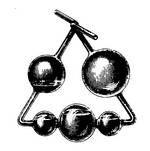


Chemistry has a history that continues to be written every day. The rapid development of the natural sciences, and thus also of chemistry, presents society with new challenges. Only those who know their history can successfully shape the future, because scientific progress is based not only on current research, but also on tradition. From the examples of the past, we learn to moderate leaps in technology and knowledge in such a way that they engage people and provide the best benefit for society.
Shortlink to this page: www.gdch.de/geschichte
We are a committed community of around 400 chemists, science historians, teachers and students who are interested in the rich history of chemistry .
Our tasks are:
In order to achieve this, we promote contacts and the exchange of experience among members and with foreign colleagues. Every two years we organize a Conference on the history of chemistry at different locations, publish the Mitteilungen as a publication organ for chemistry history treatises and support the work of the GDCh commission "Historic Sites of Chemistry". We work closely with other GDCh Divisions , in particular the German Young Chemists Network, the chemical education Group and the Senior Expert Chemists.
The Board consists of the chairman, his Deputy and at least one, but no more than five, additional members.
more
Bettina-Haupt-Förderpreis for the history of chemistry
more
Paul Bunge Prize of the Hans R. Jenemann Foundation
more
The five-ball apparatus developed by Justus Liebig in 1830 simplified chemical elemental analysis and enabled research-based laboratory teaching. This instrument, also known as the potassium apparatus, soon became an international symbol of the chemical profession's self-image. For those interested in the operation and capabilities of the five-ball apparatus, see: Melvyn Usselman, Alan Rocke, Christina Reinhart, Kelly Foulser, "Restaging Liebig. A Study in the Replication of Experiments", Annals of Science 62 (2005), 1-55.
March 19 - 20, Lübeck
more
Do, 19.03.2026, 16:30 Uhr, Lübeck
Tagesordnung
Department of history of chemistry more
in cooperation with the Division of History of Chemistry
more
GDCh program to honor achievements in chemistry of historical importance since 1999
more
Explanation of the historical Divisions of the natural scientific societies in Germany
more
GDCh Office
Nicole Bürger , Dipl.-Biol.
+49 69 7917-231
This page has been machine translated. If you have any feedback or comments please feel free to contact us. 
last modified: 23.02.2026 06:59 H from Translator